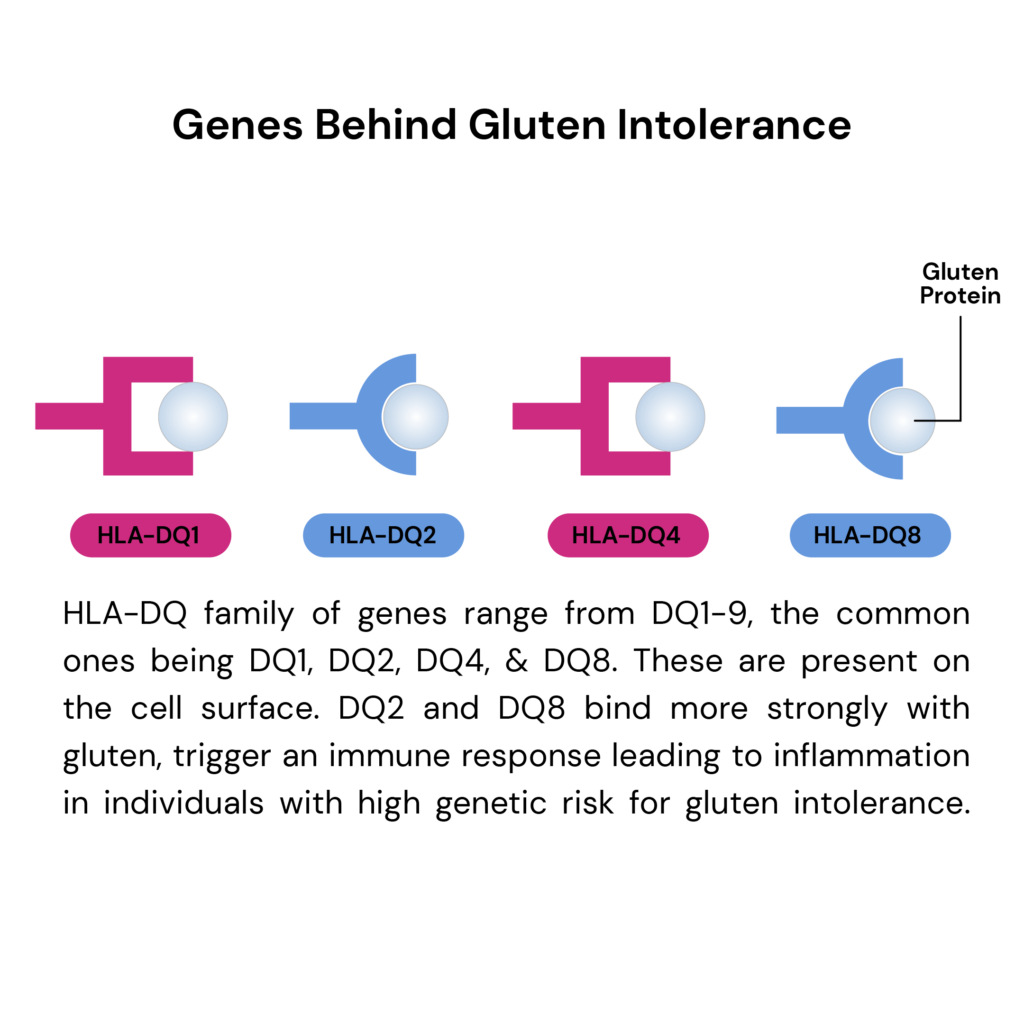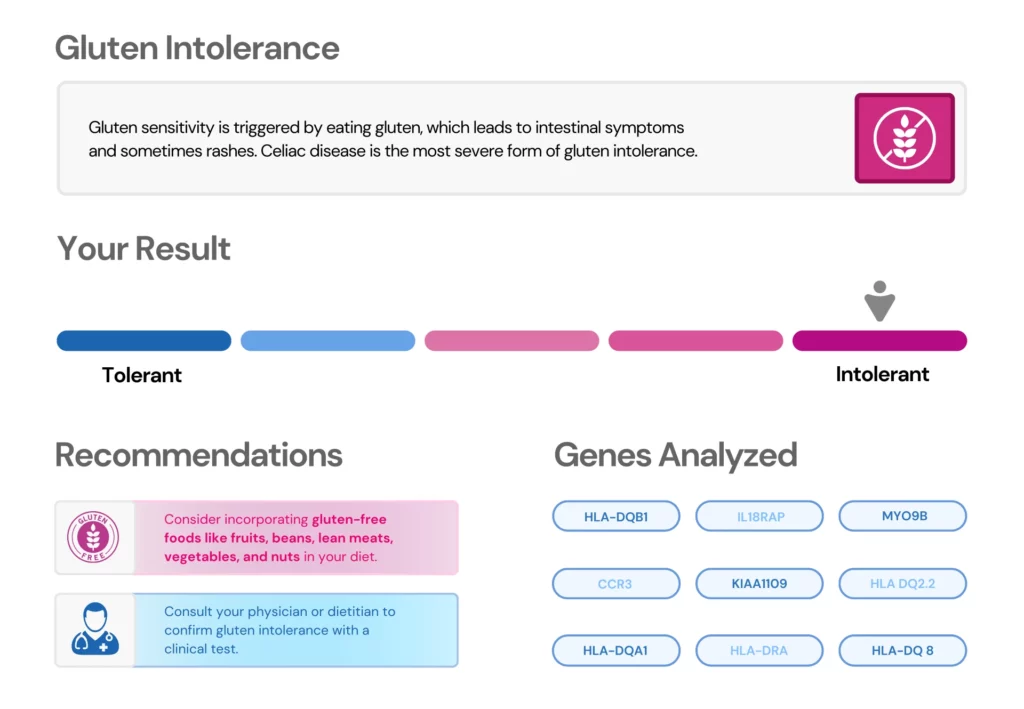Did you know that gluten sensitivity affects about 6% of the U.S. population, making it more common than celiac disease, which only impacts roughly 1%? Many people experience bloating, fatigue, or digestive discomfort after eating gluten, but not all of them have celiac disease or a wheat allergy. Could gluten sensitivity be in your genes, or are other factors influencing your reaction to gluten? How can you tell if you're at risk? Read on to explore the complexities of gluten sensitivity and uncover what science reveals about the role of genetics and beyond.
Gluten Sensitivity: An Overview
Gluten sensitivity, also termed non-celiac gluten sensitivity (NCGS), is a condition where individuals react negatively to gluten, a protein in barley, wheat, rye, and other grains.
While commonly associated with foods like bread, pasta, and beer, gluten is also found in some non-food items like cosmetics and medications.
It’s important to understand that NCGS differs from celiac disease, which is an autoimmune disorder influenced by gluten consumption.
Unlike celiac disease, NCGS does not cause damage to the intestines and is also distinct from a wheat allergy.
People with gluten sensitivity often experience bloating, gas, fatigue, and nausea.
The Role Of Genetics In Gluten Sensitivity
Genetics plays a pivotal role in gluten sensitivity, with the condition often running in families and appearing in siblings or cousins.
The genetic basis lies primarily in variations of the HLA-DQ gene (HLA stands for human leukocyte antigen), which individuals inherit from both parents.
Specific combinations of HLA-DQ genes, particularly HLA-DQ2 and HLA-DQ8, significantly increase the risk of developing gluten sensitivity.
Gluten exposure in sensitive individuals can cause a wide range of effects. These can be as mild as slight stomach discomfort or as serious as damage to the intestines.
When the intestines are damaged, the body may have trouble absorbing essential nutrients from food. This can lead to various health problems over time.
The severity of the condition depends on both genetic factors and gluten intake.
Dietary management is crucial for those with pronounced gluten sensitivity, especially celiac disease.
Eliminating gluten from the diet is often the most effective approach to prevent symptoms and avoid long-term health complications.
Genes Involved In Gluten Sensitivity
Gluten sensitivity is linked to certain genetic markers, though the connection is less clear than with celiac disease.
Research by Dr. Alessio Fasano from the University of Maryland found that only 56% of those with gluten sensitivity carry the HLA-DQ2 or HLA-DQ8 genes.
These genes are strongly associated with celiac disease, suggesting that while they may play a role, they are not the primary cause of gluten sensitivity.
Another study by Dr. Kenneth Fine, developer of EnteroLab testing, suggests genes like HLA-DQ1 and HLA-DQ3 might also contribute to gluten sensitivity.
He believes that only a small fraction of the population lacks the genetic potential for gluten sensitivity.
However, further research has yet to accept or validate these findings widely.
Is There A Gluten Sensitivity Gene?
Yes, there is a gluten sensitivity gene with certain variants that are more influential:
- HLA-DQ2 and HLA-DQ8: Strongly associated with gluten sensitivity
- HLA-DQ3 and HLA-DQ1: Possible involvement, but less evident

If I Have Gluten Gene Mutations, Will I Have Gluten Sensitivity?
Gluten gene mutations like HLA-DQ2 or HLA-DQ8 increase the risk of developing gluten sensitivity, but their presence doesn't definitively predict the condition.
While strongly associated with the condition, not everyone with these mutations experiences symptoms.
Gluten sensitivity can also occur in individuals without these specific genetic markers, indicating that other factors contribute to its development.
Does Everyone Have The HLA-DQ8 Gene?
Not everyone carries the HLA-DQ8 gene.
According to studies, approximately 30%-40% of the general population has either the HLA-DQ2 or HLA-DQ8 genes without developing celiac disease.
Among those with celiac disease, about 95% express the HLA-DQ2 gene, while the remaining 5% typically have the HLA-DQ8 gene variant.
Gluten Sensitivity Genetic Test: How To Identify Your Risk?
If you have done an ancestry genetic test with companies like 23andMe, AncestryDNA, MyHeritage, etc., you can download your raw DNA data, order the Gene Nutrition test, and upload your file for analysis.

Other Non-genetic Factors Influencing Gluten Sensitivity
While genetics play a significant role in gluten sensitivity, other factors can also affect its development and severity. These include:
Environmental Factors
- Gut microbiome: The bacterial composition in the gut can influence the body's reaction to gluten.
- Dietary factors: Excessive gluten consumption may trigger symptoms, even in those without a genetic predisposition.
- Intestinal permeability: Increased permeability of the intestinal lining (leaky gut) can allow gluten proteins to enter the bloodstream more easily.
- Inflammation: Chronic inflammation can worsen symptoms of gluten sensitivity.
Lifestyle Factors
- Stress: High stress levels can impact digestive health and contribute to gluten sensitivity symptoms.
- Diet: Consumption of processed foods and additives can influence gut health.
Demographic Factors
- Age: Gluten intolerance can develop at any age.
- Sex at birth: Gluten sensitivity is more prevalent in females.
It's important to note that while these factors can contribute to gluten sensitivity, ongoing research is working to understand their specific roles better.
What Is The Gluten Intolerance Gene Test?
At present, no diagnostic procedure exists specifically for gluten sensitivity. The gluten intolerance gene test is more precisely a genetic risk assessment for celiac disease.
This test examines DNA for specific gene variants, especially in the HLA-DQ complex, associated with an increased risk of developing gluten intolerance.
Key Details Of The Test
- Purpose: To determine genetic predisposition to gluten intolerance or celiac disease.
- Focus: Identifies gene variants like HLA-DQ2 and HLA-DQ8, which are associated with gluten sensitivity.
- Method: A sample of DNA is collected, usually through a cheek swab or blood sample, which is then examined in a laboratory.
- Outcome: Results indicate whether or not you have genetic markers linked with an elevated risk of gluten intolerance. However, a positive result does not guarantee you will develop the condition, as other factors also play a role.
Individuals suspecting gluten intolerance can use the test to evaluate their genetic risk before changing their diet or seeking medical advice.
What Does It Mean To Be Positive For DQ8?
Being positive for DQ8 means carrying the HLA-DQ8 gene, which is part of the HLA gene complex.
This gene variant is linked to a higher risk of gluten sensitivity and celiac disease.
While having the DQ8 gene does not guarantee that you will develop these conditions, it does indicate a higher genetic predisposition.
The presence of DQ8 suggests that your immune system might react adversely to gluten, potentially leading to intestinal damage if celiac disease develops.
Testing positive for DQ8 can help in diagnosing celiac disease, especially when combined with other medical tests and symptoms.
Summary: Gluten Sensitivity Genes
- Gluten sensitivity is a condition where individuals react negatively to gluten without having celiac disease or a wheat allergy.
- Genetics play a crucial role in gluten sensitivity, with the HLA-DQ2 and HLA-DQ8 genes strongly linked to the condition, though their presence doesn’t guarantee symptoms.
- Other HLA-DQ genes, like HLA-DQ1 and HLA-DQ3, might also contribute to gluten sensitivity.
- Not everyone with gluten sensitivity has these genetic markers, indicating other factors, such as gut microbiome, diet, and lifestyle, can also influence its development.
- Testing for gluten intolerance primarily focuses on assessing genetic predisposition, especially to celiac disease, but it cannot definitively predict gluten sensitivity.
Others Are Also Reading

Gluten-Free Good For You? Analyze Your DNA Raw Data Now!

How Genes Influence Your Risk For Lactose Intolerance
References
https://my.clevelandclinic.org/health/diseases/21622-gluten-intolerance
https://celiac.org/about-celiac-disease/what-is-celiac-disease
https://www.mayoclinic.org/diseases-conditions/wheat-allergy/symptoms-causes/syc-20378897
https://pubmed.ncbi.nlm.nih.gov/11892082
https://www.ncbi.nlm.nih.gov/pmc/articles/PMC3641836
https://www.ncbi.nlm.nih.gov/pmc/articles/PMC6502200
https://www.ncbi.nlm.nih.gov/pmc/articles/PMC10096482
https://my.clevelandclinic.org/health/diseases/21622-gluten-intolerance
https://www.verywellhealth.com/gluten-sensitivity-genes-562967
https://www.verywellhealth.com/hla-dq8-one-of-the-main-celiac-disease-genes-562571




